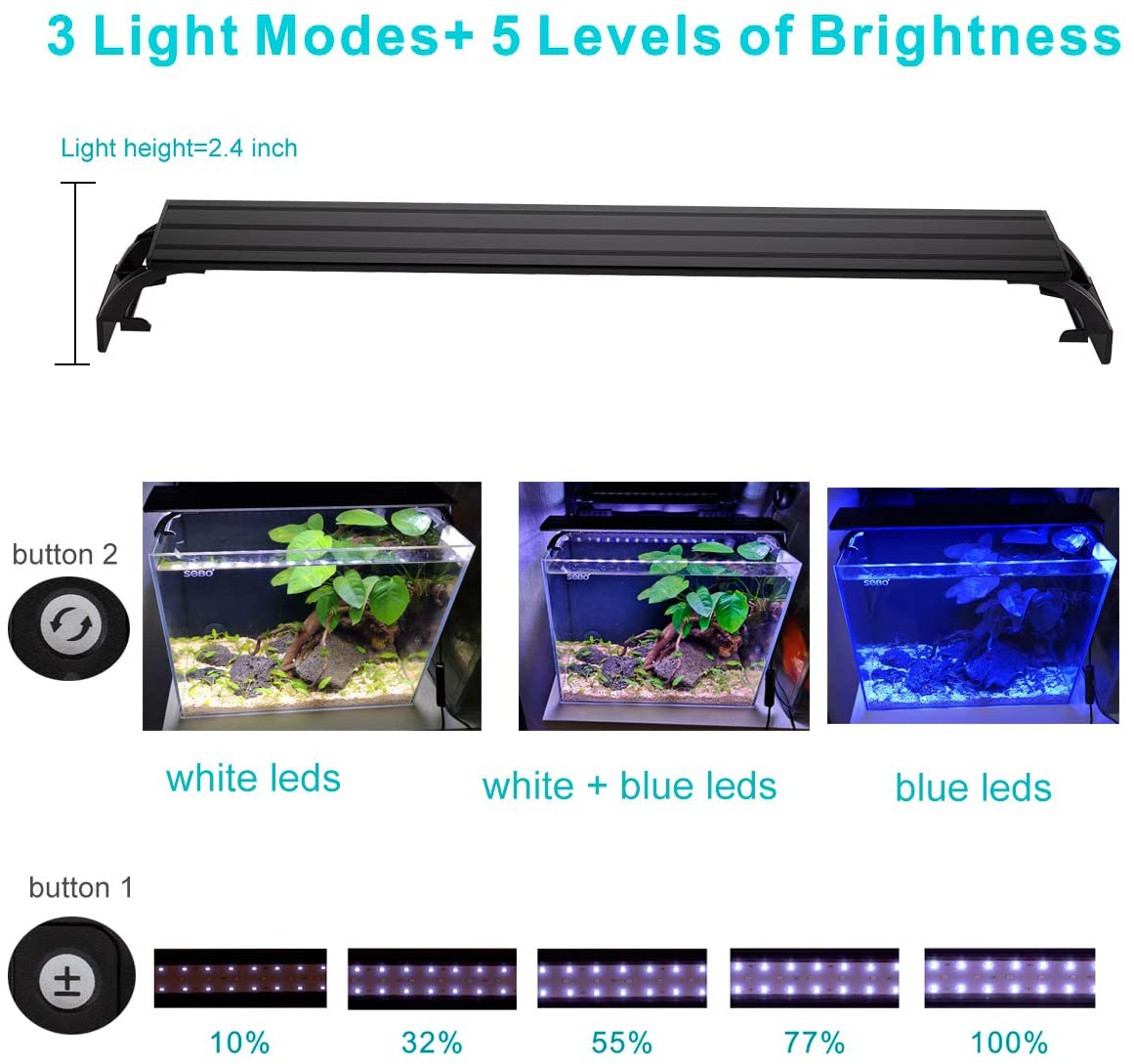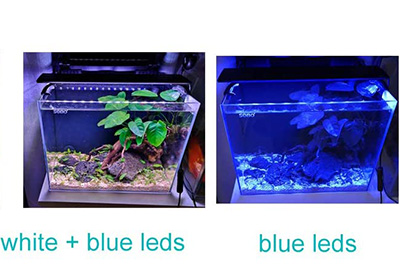Aquarium enthusiasts often wonder whether or not they should turn off their aquarium lights at night. While some believe leaving the light on continuously is beneficial for the fish and plants, others argue that a period of darkness is necessary for their well-being. The truth is, there are pros and cons to both sides of the argument, and it ultimately comes down to personal preference and the specific needs of your aquatic inhabitants.
On one hand, leaving the aquarium light on at night can provide a beautiful and calming ambiance to your living space. It can also benefit certain fish species, such as those that come from brightly-lit environments in the wild. However, there are also potential drawbacks, including an increased risk of algae growth and disrupted sleep patterns for both fish and plants. So, should you turn off your aquarium light at night? Let’s explore both sides of the debate to help you make an informed decision.
Yes, you should turn off your aquarium light at night. Fish need a period of darkness to rest and maintain their natural circadian rhythm. Leaving the light on 24/7 can also lead to excessive algae growth and higher electricity bills. To mimic natural day and night cycles, it’s recommended to provide 8-12 hours of light per day and 12-16 hours of darkness.

Should I Turn Off My Aquarium Light at Night?
Aquariums are a beautiful addition to any home or office, but many people are unsure whether they should turn off their aquarium light at night. Some people believe that leaving the light on all the time can harm the fish, while others think it’s necessary to keep the aquarium healthy. In this article, we’ll take a closer look at whether you should turn off your aquarium light at night and what benefits it can bring.
Benefits of Turning Off Your Aquarium Light at Night
Turning off your aquarium light at night can have several benefits. Firstly, it can help regulate the fish’s natural sleep cycle. Just like humans, fish need a certain amount of darkness to rest and recharge. By turning off the light at night, you can help your fish get the sleep they need to stay healthy and happy.
Secondly, turning off your aquarium light can help prevent algae growth. Algae thrive in light, so by keeping the light on all the time, you’re giving them the perfect environment to grow. By turning off the light at night, you can limit the amount of time that algae have to grow, which can help keep your aquarium clean and healthy.
Disadvantages of Leaving Your Aquarium Light on All the Time
While some people believe that leaving the aquarium light on all the time is necessary, there are actually several disadvantages to doing so. Firstly, as mentioned earlier, it can disrupt the fish’s sleep cycle. Fish rely on natural light to regulate their sleep, so by keeping the light on all the time, you’re depriving them of this important cue.
Secondly, leaving the light on all the time can lead to algae growth, as mentioned earlier. This can make your aquarium look dirty and unappealing, and can also be harmful to the fish if it gets out of control. Additionally, leaving the light on all the time can increase the temperature of the water, which can also be harmful to the fish.
How Long Should You Keep the Aquarium Light On?
Now that we’ve established that it’s important to turn off your aquarium light at night, you might be wondering how long you should keep it on during the day. The answer to this question depends on several factors, including the type of fish you have and the plants in your aquarium.
Generally speaking, most aquariums require between 8-10 hours of light per day. However, this can vary depending on the specific needs of your fish and plants. Some fish require less light than others, and some plants require more. It’s important to do some research on the specific needs of your aquarium inhabitants to determine the best lighting schedule for your tank.
Benefits of Using a Timer for Your Aquarium Light
One way to ensure that your aquarium light is on for the appropriate amount of time is to use a timer. A timer can be set to turn the light on and off at specific times, which can help regulate the fish’s sleep cycle and prevent algae growth.
Using a timer can also save you money on your energy bill. By only running the light for the necessary amount of time, you’re not wasting energy or money on unnecessary lighting.
Should You Use a Moonlight for Your Aquarium?
Some aquarium owners choose to use a moonlight for their aquarium instead of turning off the main light at night. A moonlight is a low-level light that simulates moonlight, which can help regulate the fish’s sleep cycle without disrupting it.
Using a moonlight can also be beneficial for plant growth. While plants don’t require as much light as fish, they still need some light to photosynthesize. A moonlight can provide just enough light for the plants to grow without disrupting the fish’s sleep.
Conclusion
In conclusion, turning off your aquarium light at night is important for several reasons. It can help regulate the fish’s sleep cycle, prevent algae growth, and save you money on your energy bill. It’s also important to ensure that your aquarium light is on for the appropriate amount of time during the day, and using a timer can help with this.
If you’re concerned about the fish’s sleep cycle, using a moonlight can be a good alternative to leaving the main light on all the time. Whatever lighting schedule you choose, it’s important to do some research on the specific needs of your aquarium inhabitants to ensure that they’re getting the appropriate amount of light.
Freequently Asked Questions
Should I Turn Off My Aquarium Light at Night?
Yes, you should turn off your aquarium light at night. Fish need a regular cycle of light and darkness to maintain their health and well-being. Just like humans, fish need rest to restore their energy levels. Turning off the light at night will also help to control the growth of algae in the tank. Algae thrive on light, so by turning off the light at night, you are limiting their growth and preventing them from taking over the tank.
However, if you have plants in your aquarium, you may need to keep the light on for a few hours each day to ensure they get enough light for photosynthesis. In this case, you can set a timer to turn the light on and off at specific times.
What Happens If I Don’t Turn Off the Aquarium Light at Night?
If you don’t turn off the aquarium light at night, your fish may become stressed and their health may suffer. Fish need a regular cycle of light and darkness to maintain their circadian rhythms. Without this, they may become disoriented and experience sleep disturbance. Over time, this can lead to a weakened immune system and increased susceptibility to disease. Additionally, leaving the light on at night can cause an overgrowth of algae, which can be harmful to your fish and other aquatic life in the tank.
To avoid these problems, it’s best to turn off the aquarium light at night and give your fish the rest they need to stay healthy and happy.
How Long Should I Keep the Aquarium Light On?
The amount of time you should keep the aquarium light on depends on the type of fish and plants you have in your tank. Generally, most fish need around 8-12 hours of light each day, while plants require around 12-14 hours of light. However, it’s important to research the specific needs of your fish and plants to ensure they are getting the right amount of light.
One way to regulate the amount of light in your aquarium is to use a timer. This will allow you to set specific times for the light to turn on and off, ensuring your fish and plants get the right amount of light each day.
Can I Use a Nighttime Aquarium Light?
Yes, you can use a nighttime aquarium light, but it’s important to choose the right type of light. Nighttime aquarium lights are designed to emit a dim, blue light that simulates moonlight. This can be helpful for nocturnal fish or for viewing your aquarium at night without disturbing the fish.
However, it’s important to note that nighttime aquarium lights should not be used as a replacement for turning off the main aquarium light at night. Fish still need a regular cycle of light and darkness to maintain their health and well-being. Additionally, using a nighttime aquarium light can disrupt the natural circadian rhythms of your fish if used for extended periods of time.
What Other Factors Affect the Lighting in My Aquarium?
Other factors that affect the lighting in your aquarium include the size and shape of the tank, the type of fish and plants you have, and the placement of the tank in your home. For example, a tall, narrow tank may require more lighting than a short, wide tank to ensure all areas of the tank are adequately lit.
The type of fish and plants you have will also affect the lighting needs of your aquarium. Some fish and plants require more light than others to thrive. Finally, the placement of your tank in your home can also affect the lighting. If your tank is located near a window, for example, it may receive more natural light than a tank located in a darker corner of the room.

Aquarium Fish Need Light at Night? Turn Off at Night?
In conclusion, whether or not to turn off your aquarium light at night depends on several factors. If your fish require a day/night cycle, it’s best to turn off the light for at least 8 hours a day. This will help keep your fish healthy and happy.
Additionally, if you have live plants in your aquarium, it’s essential to provide them with a light cycle. Plants use light to photosynthesize, and without it, they cannot survive. Therefore, turning off your aquarium light at night may not be the best option for planted tanks.
Lastly, if you are concerned about algae growth in your aquarium, turning off the light at night can help. Algae thrive in the presence of light, so limiting their exposure can help control their growth. However, it’s important to strike a balance between controlling algae and maintaining a healthy environment for your fish and plants.
In summary, the decision to turn off your aquarium light at night depends on the specific needs of your fish and plants. By understanding these requirements, you can make an informed decision that will keep your aquarium thriving for years to come.
